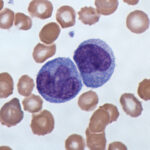Could Chemotherapy Efficacy Be Better?
Researchers further chemotherapy efficacy by identifying antibodies that attack a specific protein in tumor cells.
By Elisa Huertas
Scientists from the Institute for Research in Biomedicine of Barcelona have found that a protein called PD-L2 in a special type of cells inside tumors, zombie cells, limits chemotherapy efficacy by protecting the tumor from the immune system. When researchers attacked PD-L2 with antibodies in human and mouse cancer cells in the laboratory, chemotherapy efficacy was higher against zombie cells. In a few years, this discovery could have a great impact on therapies against cancer.
Zombie cells?
We have billions of cells that play different roles in the body depending on where they live, but there is something in common in most of them: they reproduce and they die. Both processes are controlled by our DNA, our genetic information. Besides, when a cell starts acting weird and can be dangerous for us, it kills itself in a process called apoptosis or programmed cell death. All of that is normal.
However, sometimes cells reproduce without control and apoptosis doesn’t happen. This is the beginning of a tumor and that is why tumors are usually defined as an abnormal mass of cells.
RELATED: Cancer Treatment from a DNA “Trojan Horse”
And there is something important to mention here: we talk about cancer when tumors have certain characteristics. Meaning, having a tumor is not the same as having cancer.
So far we may think that a tumor is made only of those abnormal cells, but that is not the case. In a tumor, there are different types of cells and substances that create a special environment in that area.
And how do we stop those cells? Chemotherapy is one of the treatments that fight cancer. It is based on different drugs that target cells that reproduce very quickly, like the cells that make tumors. But, like every other treatment, it has side effects, one of which is the capacity to create zombie cells.
Chemotherapy and radiotherapy can lead to senescence in cells inside different types of tumors. This process is called therapy-induced senescence (TIS) and stops the reproduction of cells, but it doesn’t kill them. Like zombies, senescent cells don’t reproduce but don’t die.
And what do these zombie cells do? In a nutshell, they have two roles: release different substances that change the tumor environment and protect it from the immune system, which leads to tumor regrowth after therapy.
And what does the immune system do here?
Our defenses are not only trained to fight things from the outside, like bacteria or viruses, but also cells from our own body that can be dangerous to us, like the ones that form tumors. So, certain immune cell types also attack tumors. That is why another of the science-based treatments against cancer is immunotherapy, which uses different techniques to help our immune system combat cancer.
However, the immune system can’t be uncontrolled; that could be dangerous. For that reason, immune checkpoints exist. They are signals in our cells that keep the immune system response from being too strong. Tumor cells know that, and they use those signals.
RELATED: Using the Immune System to Treat Cancer
Improving chemotherapy efficacy? How?
Let’s break down how immune checkpoints are signals. They are proteins on the surface of cells, like traffic cones reminding our immune system to be careful. One example of them is the protein PD-1, which works better when another protein sticks to it, in this case, PD-L2. Let’s say that PD-1 is a traffic cone and PD-L2 is a STOP signal on top of it.
What researchers found was that, in tumors that have been treated with chemotherapy, many different types of zombie cells have these STOP signals on their surface, the protein PD-L2. When the immune system faces these cells, it thinks that it has to stop and not attack the tumor, which results in the tumor regrowth. And that is the reason why chemotherapy efficacy isn’t as good as expected.
It is important to mention that the protein PD-L2 doesn’t make the cells become zombies; in other words, PD-L2 doesn’t cause senescence in tumor cells. But it is way more present in them.
Also, the researchers saw PD-L2 attached to the surface of immune cells—to be precise, CD8+ T cells, a type of lymphocytes. When PD-L2 connects to these lymphocytes, it inactivates them to protect the tumor.
Luckily, scientists are also aware of the immune checkpoints and how some proteins like PD-L2 use them to protect the tumor. For example, it has already been proven in other studies that blocking the protein PD-1, the traffic cone, and other STOP signals similar to PD-L2, improves chemotherapy efficacy.
How did they test all that?
To get all this information on how zombie cells and PD-L2 are related, and how it affects chemotherapy efficacy, they used different tests.
First, they studied different types of cancer cells from humans and mice alone, what we call an in vitro experiment. The types of cancer cells they studied were: human melanoma cells (skin cancer), mouse melanoma cells, mouse pancreatic cancer cells, human lung cancer cells, human head and neck cancer cells, human pancreatic cancer cells, and human osteosarcoma cancer cells (bone cancer).
Next, they did in vivo experiments, which means they used living animals (mice) to study how the cells behaved. For that, they studied mice and human cancer cells in living mice. They made mice develop tumors and treated them with chemotherapy to analyze the therapy-induced senescence and see if the cells inside the tumor showed PD-L2.
Then, they created cancer zombie cells without PD-L2 and compared in vivo how chemotherapy worked in zombie cells with and without PD-L2. They saw that tumors made of zombie cells without PD-L2 could be controlled better and were attacked by the lymphocytes mentioned earlier.
Lastly, scientists tested in vivo what could happen if they treated mouse breast cancer with chemotherapy and, at the same time, antibodies that attack the protein PD-L2. They found that the tumor was completely gone and that the lymphocytes also attacked the zombie cells.
Antibodies are a type of protein from our immune system that helps us fight things that we don’t want inside our body. But they can be created in the laboratory, as is the case of some vaccines or other treatments like immunotherapy.
Read more about proteins in the body: New Data on Protein Structure in Blood Cells
What can you do against cancer?
The annual observance of World Cancer Day in February is a reminder of the importance of knowing the risk factors for developing different types of cancer and how to prevent them.
The biggest risk factors for developing cancer are alcohol, tobacco, vaping, a diet based on high-processed food, having obesity or overweight, lack of physical exercise, sun radiation or attending tanning salons, having high-risk sexual behaviors like not using protection, and being exposed to pollutants.
RELATED: Killing Cancer From the Inside
Therefore, the keys to preventing most types of cancer are: eating mostly vegetables, fruit, legumes, nuts, and wholemeal food; practicing regular physical exercise; avoiding alcohol, tobacco, and vaping; having safe sexual practices; using sun protection; getting vaccines such as the human papillomavirus (HPV) vaccine; and breastfeeding.
Looking ahead to more cancer research
To summarize, we have seen that treatments like chemotherapy can lead to unwanted effects on tumors, like senescence. This transforms different cells inside the tumor into zombie cells that protect the tumor and make it grow again. Besides, our immune system needs to follow some signals or immune checkpoints to avoid being dangerous to our bodies. Zombie cells use those signals to protect the tumor.
This research team saw a protein called PD-L2 on the surface of zombie cells that tells the body’s immune system not to attack the tumor, making chemotherapy not enough to destroy it. A combination of antibodies attacking the protein PD-L2 and chemotherapy could kill zombie cells by allowing the immune system to fight.
An important point that we need to be aware of is that this study was done on animals. Therefore we can’t say yet that this treatment is going to work perfectly in humans; next it has to be tested with people.
This means that many years can pass before we can see immunotherapy based on blocking PD-L2 with antibodies in humans to improve chemotherapy efficacy. Also, bear in mind that every treatment has side effects. In conclusion, this could be a great advantage in the future but more experiments need to be done.
This study was published in the peer-reviewed journal Nature Cancer.
Reference
Chaib, S., López-Domínguez, J. A., Lalinde-Gutiérrez, M. … & Serrano, M. (2024). The efficacy of chemotherapy is limited by intratumoral senescent cells expressing PD-L2. Nature Cancer 5, 448–462. https://doi.org/10.1038/s43018-023-00712-x


About the Author
Elisa Huertas is a science communicator who loves music, reading, and the Lord of the Rings. She studied a master’s in science communication and journalism and has an academic background in nutrition. She is Spanish but she lives in Ireland with her husband and daughter. Connect with Elisa via her website or follow her on Instagram and TikTok @elisadivulga.




